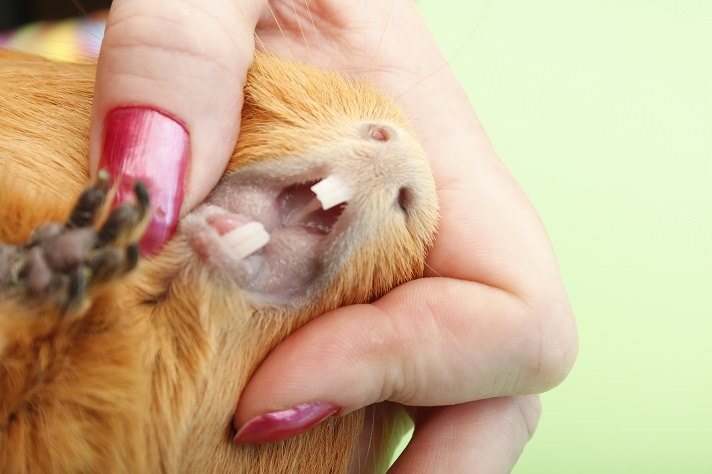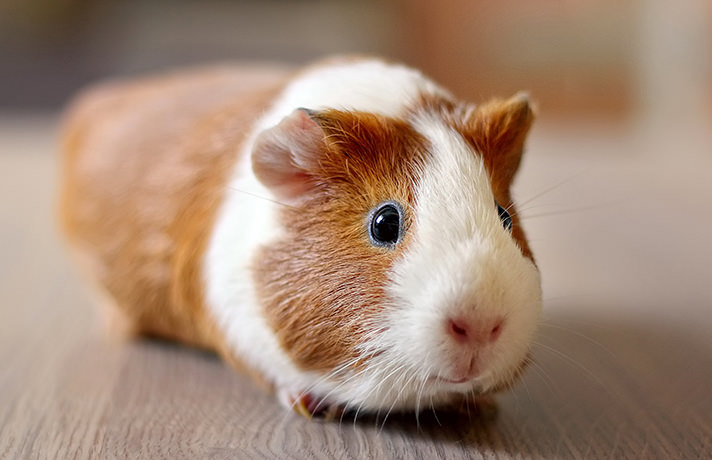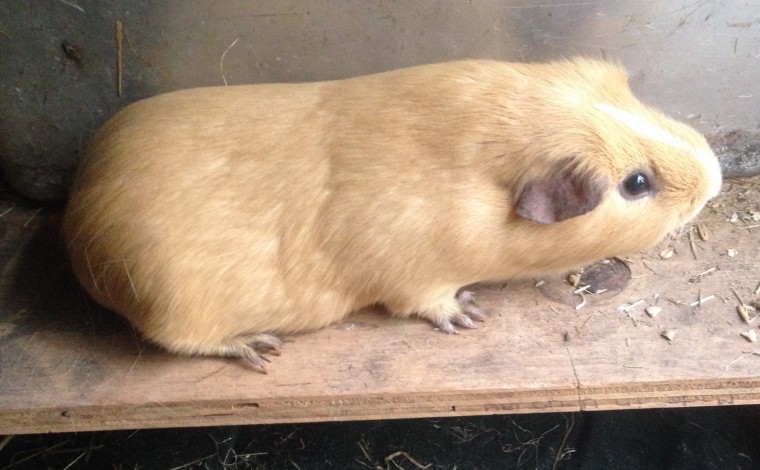Guinea pigs are quite strong animals. With proper care and proper nutrition, they can live their whole lives without a single illness. However, if you intend to have such a cute pet, you should know in advance what problems you may encounter in the future. All diseases of guinea pigs can be divided into infectious pathologies provoked by bacteria and viruses, genetic defects, parasitic infestations, diseases from malnutrition and mechanical damage.

A good veterinarian, having carried out the necessary diagnostics, can not only identify the problem, but also correctly eliminate it. The owner needs to carefully monitor his pet in order to notice that something is wrong and to start treating the disease in guinea pig in time. Often such animals die, because people can not determine the first signs and symptoms of an ailment. It is worth noting that guinea pigs are very calm and unperturbed, therefore, ill, they can not betray their condition. In such cases, a serious disease may go unnoticed, and when it is still discovered, it may be very late. To prevent the irreparable, you need to understand that any, even the smallest deviation from the norm is an occasion to contact a veterinary clinic.
When do I need to sound the alarm?
Let's look at the first signs of an illness in guinea pig:
- the animal has dull hair, which sticks together, shaggy, does not even out and falls out at the slightest touch;
- the presence of inflamed bald patches, sores on the skin indicates the appearance of blood-sucking parasites;
- the pig often sneezes, coughs, trembles, breathes faster, closes his eyes, drinks constantly, she has too loose or dry stools;
- the animal has festering eyes, it often scratches behind the ears and tries to hide;
- high fever (above 39.5 degrees), cramps, paralysis.
Lack of vitamins and minerals
For rodents, special balanced feeds are produced that contain all the components necessary for the health of animals. However, many diseases of guinea pigs are associated precisely with the lack of a substance. A similar situation can be observed due to improper formation of the diet of animals. For example, a deficiency of vitamin C is a common problem in such pets. It is worth noting that the guinea pig body cannot independently produce this component, so the owner needs to take care of its sufficient amount in the feed. Otherwise, the rodent may develop scurvy and weakened immunity, as a result of which it will hurt even from a small draft. To prevent the disease of guinea pigs, you need to give them enough vegetables and fruits. Also useful will be parsley tops and rosehip infusions.

With a vitamin D deficiency, a pet may develop rickets. Typically, this problem is observed in young pigs in winter due to insufficient sunlight. Symptoms of the disease in guinea pigs are manifested by an increase in joints, arching of the back, growth retardation and curvature of the limbs.
As a result of vitamin A deficiency, skin problems and various eye diseases can occur. Deficiency of vitamin E affects the coat of guinea pigs, and a small intake of vitamin K in the body makes the animal immune to external stimuli.
Guinea Pig Diseases
- Anophthalmia is a disease in which one or both eyes are absent.
- Microphthalmia is a congenital pathology in which the size of the eye is less than normal. It occurs when mating animals with lethal genes, during the period of fetal development, it is often accompanied by an inflammatory process.
- Blindness is a complete or partial lack of vision. It can be congenital or acquired as a result of corneal damage, diabetes mellitus, infection, poisoning, falling from a height, aging.
- Keratitis, keratoconjunctivitis, conjunctivitis occur due to the ingestion of a foreign body, trauma, infection. Symptoms include redness, lacrimation, purulent and mucous discharge.
- Cataracts - clouding of the lens, which leads to visual disturbances until it is lost. It happens congenital, acquired and age.
- Nystagmus is characterized by twitching of the eyeball due to injury or disruption of the vestibular apparatus. Accompanied by inflammation of the inner ear.

- Retrobulbar abscess - protrusion of the eyeballs as a result of trauma to the walls of the orbit by the sprouted roots of the teeth. Such an eye needs to be removed.
- "Fat" eye - protrusion of the conjunctival sac, needs plastic.
- Inversion of the century - a hereditary disease of guinea pigs, in which the eyelashes rub against the eyeballs. They should be glued with a special ointment to the upper eyelid.
- Ossification of the eye is congenital or manifests itself in violation of mineral metabolism. At the same time, the outflow of fluid inside the eye is impeded, eye pressure rises, nerve cells are destroyed, which can cause loss of vision.
Eye Disease Treatment
Without prior consultation with the veterinarian, no treatment can be carried out, since it can thus only aggravate the situation. Before using corticosteroids, you must make sure that the cornea is not damaged, since such drugs interfere with its recovery, therefore, it is contraindicated in such situations. The condition of the cornea is checked using special test strips containing fluorescein, which stains the damaged area in yellow.
Before processing the patient's eye, pus and dirt must be removed so that the effect and concentration of medications do not decrease. For this, a warm 0.9% saline solution or acetylcysteine, which dissolves the mucus, is used. Allocations can be removed with a cotton pad, which is pre-moistened with a solution of furatsilina or ordinary boiled water. Please note that tea leaves and chamomile broth are strictly contraindicated, since they dry the mucous membrane and contribute to the development of fungi and bacteria.
Guinea pig eye diseases, the symptoms and treatment of which are closely related, require special attention of an ophthalmologist. An important step is the restoration of the cornea using vitamins A and C. To eliminate dry eyes, artificial tear preparations are indicated. Ointments and drops of antibacterial action are used up to 4 times a day, sometimes more often.
Serious eye injuries require the use of such drugs:
- Tobrex;
- "Tsiprovet";
- Chloramphenicol;
- Tsipromed.
When injuring the cornea, the following drugs are added to the above:
- Korneregel (gel);
- Solcoseryl (gel);
- "Balarpan" (drops).
Viral diseases
What diseases in guinea pig can be triggered by viruses? The most dangerous viral pathologies are paralysis and pestilence. Such diseases are manifested by seizures and paralysis of the limbs. The animal must be taken to the vet immediately.
Symptoms of other viral diseases include:
- diarrhea;
- sticky wool;
- unusual behavior;
- nasal discharge.
Of the bacterial ailments, pseudotuberculosis is worth noting, in which guinea pig has frequent diarrhea, provoking severe exhaustion. This disease is contagious, so the animal must be isolated so that the rest do not die.
Parasitic infestations
In guinea pigs, parasites are external (ectoparasites living on the skin) and internal (endoparasites that settle in the internal organs). The first can include poohoedov, ticks and fleas, whose vital activity leads to frequent scratching of the animal and the formation of bald patches. If you start the disease, then the animal will have festering wounds and allergic eczema, which is fraught with the development of pathologies of a bacterial nature. Today in pet stores a large number of drugs are presented that help to easily cope with such a problem.
However, the situation with endoparasites is much more complicated, since they are not easy to detect and display. Most often in guinea pigs there are worms, flukes and tapeworms (tapeworms). In this case, the animal is depleted, and its appearance of bowel movements changes. In no case do not give the animal preparations arbitrarily, so you can only do harm. Be sure to take the rodent to the veterinarian and pass the necessary tests.
Digestive problems
Diseases of guinea pigs and their treatment are issues that a specialist should decide. However, it is worth paying attention to the fact that most health troubles arise due to improper nutrition and care. Unfortunately, the owners often give their pets products that are generally contraindicated for them. In addition, the guinea pig can get sick from hypothermia, so at this point it is also worth paying close attention.
Symptoms of digestive system diseases include:
- loose stools;
- decreased appetite;
- general weakness;
- apathy.
If your animal has such manifestations, it is worth doing a gastric lavage. To do this, take a teaspoon of castor or petroleum jelly oil and pour into the mouth of a guinea pig. Then it is necessary to give the pet a third of the tablets twice a day, one of the following drugs: Enteroseptol, Levomycetin, Phthalazole, Biomycin, Synthomycin. In case of constipation, it is necessary to give only castor or liquid paraffin. If symptoms persist, immediately bring the animal to the veterinarian.
Respiratory diseases
We continue to consider diseases of guinea pigs. The photos presented in the article show us cute and harmless animals that really need proper care and proper nutrition. These rodents are often diagnosed with pneumonia, which develops due to severe hypothermia. You cannot let guinea pigs run on the cold floor and keep them in the draft. It is important to treat the common cold in an animal in a timely manner, which can also lead to pulmonary inflammation and even death.
Pay attention to the following symptoms:
- the pig almost does not respond to irritants and lies on its back;
- the animal has discharge from the nose;
- the animal refuses food, it is lethargic and hardly moves;
- there are no sounds that the animal usually makes;
- the rodent is constantly trying to hide.
Prevention
Veterinarians recommend following these simple rules:
- choose the right diet for your pet;
- monitor the purity of hay and the freshness of water;
- to sharpen your teeth, give the pet solid wood;
- put the cage away from damp and drafts, watch for its cleanliness;
- do not allow overcooling, overheating and wetting of the animal;
- let the guinea pig run, it is good for her health;
- control the length of the claws of the pet so that it does not grow too much.
Finally
In order for the animal to live a long and happy life, it is necessary to provide him with proper care. Guinea pigs, unfortunately, do not live very long, so you need to create comfortable conditions for them so that they please you with their cute antics and mischief longer.